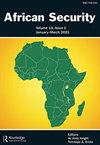Combating Violent Extremism in Africa: Terrorism and Piracy
IF 1.3
Q2 POLITICAL SCIENCE
引用次数: 1
Abstract
Terrorism and piratical acts continue to be major security challenges in Africa. This combined issue of African Security (volume 12, issues 3/4) brings a critical focus on attempts to combat these virulent forms of violent extremism on Africa’s West and East Coasts: Boko Haram in the Lake Chad Basin and piracy in Djibouti and Kenya. Combatting violent extremism in the first case has been an abysmal failure, whereas in the second case there are signs of hope that security sector reforms (SSR), with the assistance of external capacity-building partners, might be a way of improving governance to counter extremist actors. The first paper provides a refreshing insight on the persistence and intractability of Boko Haram. The paper “‘Weak state’, regional power, global player: Nigeria and the response to Boko Haram” goes beyond prevailing orthodox understanding of the nature of the Nigerian state and its failure to defeat Boko Haram. The authors, Mickler, Dan Suleiman and Maiangwa, pose a fundamental question: Why was there no effective effort by the Nigerian state or external actors to curb the excessive violence of Boko Haram from July 2010 to January 2015? That period was marked by significant territorial expansion of Boko Haram and an attendant exponential increase in mass civilian casualties. Mickler et al. argue that the character of the international relations of Nigeria is one critical area that has been neglected by scholars. The paper’s perspective is a fascinating one with a rather unique conclusion: the patently contradictory trifecta of state weakness, regional strength and global status immanent in Nigeria created the conditions leading to the country’s ineffectual response to Boko Haram. State weakness fostered an inept and corruption-ridden response while Nigeria’s regional and global stature ensured that regional entities, such as the Economic Community of West African States (ECOWAS) and the African Union (AU) and global institutions were unable to take the kind of combative steps that might have defeated Boko Haram were those bodies dealing with a less prominent state. The article implies that ostensibly weak states may in fact be able to deploy their regional and international status and diplomacy in a way that prevents external intervention in their internal affairs. In a thematically related piece, Edward Stoddard interrogates the tendency of observers and scholars to treat Boko Haram as a monolithic entity. In the second paper of this issue, Stoddard draws on the concept of “revolutionary warfare” to juxtapose the two factions of Boko Haram – the “Islamic State West Africa Province” (ISWAP) led by Abu Musab al-Barnawi (until March 2019), and Jama’at Ahl as-Sunnah lid-Da’wah wa’l-Jihad (“the People Committed to the Prophet’s Teaching and Jihad” or JASDJ) led by Abubakar Shekau. The concept of revolutionary warfare includes, inter alia revolutionary ideology, garnering public support and guerrilla tactics ensconced within an overall goal – establishing a new socio-political order. The analysis reveals the politico-military characters of the two factions of Boko Haram and signals that the terrorist organization is far from a unified movement. Stoddard’s analysis demonstrates that the texture of ISWAP’s activities evinces a revolutionary warfare approach and an arguably AFRICAN SECURITY 2019, VOL. 12, NOS. 3–4, 269–271 https://doi.org/10.1080/19392206.2019.1678230在非洲打击暴力极端主义:恐怖主义和海盗
恐怖主义和海盗行为仍然是非洲面临的主要安全挑战。本期《非洲安全》合刊(第12卷,第3/4期)重点关注如何打击非洲东西海岸的暴力极端主义:乍得湖盆地的博科圣地以及吉布提和肯尼亚的海盗。在前一种情况下,打击暴力极端主义是一个严重的失败,而在第二种情况下,有迹象表明,在外部能力建设伙伴的协助下,安全部门改革(SSR)可能是改善治理以打击极端主义行为者的一种方式。第一篇论文对博科圣地的持久性和顽固性提供了令人耳目一新的见解。《“弱国”、地区大国、全球参与者:尼日利亚与对博科圣地的回应》这篇文章超越了对尼日利亚国家性质及其未能击败博科圣地的主流正统理解。作者米克勒、丹·苏莱曼和迈安古瓦提出了一个根本性的问题:为什么从2010年7月到2015年1月,尼日利亚政府或外部行为者没有采取有效措施来遏制博科圣地的过度暴力?那段时期的特点是博科圣地的领土大幅扩张,随之而来的是大规模平民伤亡呈指数级增长。Mickler等人认为,尼日利亚国际关系的特征是一个被学者们忽视的关键领域。这篇论文的观点引人入胜,并得出了一个相当独特的结论:尼日利亚固有的国家软弱、地区强大和全球地位这三个明显矛盾的三重因素,创造了导致该国对博科圣地反应无效的条件。国家的软弱助长了无能和腐败的反应,而尼日利亚的地区和全球地位确保了西非国家经济共同体(ECOWAS)和非洲联盟(AU)等地区实体以及全球机构无法采取可能击败博科圣地的那种战斗步骤,而这些步骤是那些与不那么突出的国家打交道的机构。这篇文章暗示,表面上弱小的国家实际上可能能够以一种防止外部干预其内政的方式部署其地区和国际地位和外交。在一篇与主题相关的文章中,爱德华·斯托达德(Edward Stoddard)质疑了观察家和学者将博科圣地视为一个整体实体的倾向。在本期的第二篇论文中,斯托达德借鉴了“革命战争”的概念,将博科圣地的两个派系——由阿布·穆萨布·巴尔纳维领导的“伊斯兰国西非省”(ISWAP)(直到2019年3月)和由阿布巴卡尔·谢考领导的“致力于先知教义和圣战的人民”(JASDJ)——并列在一起。革命战争的概念,除其他外,包括革命的意识形态、争取公众支持和游击战术,这些都隐藏在一个总目标内- -建立新的社会政治秩序。该分析揭示了博科圣地两个派系的政治和军事特征,表明该恐怖组织远非一个统一的运动。斯托达德的分析表明,ISWAP活动的结构表明了一种革命性的战争方法,可以说是非洲安全2019,VOL. 12, no . 3-4, 269-271 https://doi.org/10.1080/19392206.2019.1678230
本文章由计算机程序翻译,如有差异,请以英文原文为准。
求助全文
约1分钟内获得全文
求助全文

 求助内容:
求助内容: 应助结果提醒方式:
应助结果提醒方式:


